Photographs: Pradeep Bandekar/Rediff.com Syed Firdaus Ashraf in Mumbai
For nearly two decades, journalist-author Hussain Zaidi has monitored the unfolding of the crime scene in Mumbai from close quarters, first as a reporter, and now as the resident editor of Asian Age/Deccan Chronicle in Mumbai.
As a crime reporter at the Indian Express, Zaidi closely followed the stories on the '93 Bombay blasts. His first book giving a detailed account of how those blasts were carried out by terrorists resulted in the widely-acclaimed Black Friday. It was later made into a film by Anurag Kashyap.
Now, Zaidi has come out with his second book, co-authored by Jane Borges, named Mafia Queens of Mumbai, which was released by director Vishal Bharadwaj in Mumbai last week in the presence of actor Rani Mukherji and television czarina Ekta Kapoor.
In an interview to rediff.com's Syed Firdaus Ashraf, Zaidi speaks about his book and the crime scenario in Mumbai city.
Why did it take you so long to come out with another book after Black Friday? It's been more than a decade since then. What provoked this book?
I was doing another book, From Dongri to Dubai. It is a book about the history of gangsters in the six decades since 1947. While I was writing that book, I realised that it was a humongous project and it was taking years and years for me to complete it.
During the research for that book I came across a lot of stuff about women criminals of Mumbai which I kept aside, because I realised it was not possible to include those stories in Dongri to Dubai. During my research, a friend of mine suggested that I should write a book on those stories, as it was an interesting subject. And that is how the idea took shape and this book came into existence.
...
'Men are not that determined compared to women'
Image: Zaidi at the book launchPhotographs: Pradeep Bandekar/Rediff.com
How many stories of women gangsters have you taken into this book, and was the selection process of these women difficult for you?
There are 13 women I have profiled in this book, out of the data on 24 women that I had. So, I had to shortlist the women. And when I was writing this non-fiction book, I had to be absolutely sure about the details.
How many of these women did meet in real life?
Some are dead. Like Jenabai, Gangubai, Sapna Didi. But I met Monica Bedi, Papa Mani, Asha Gawli, Manisha and some others. My co-author Jane Borges has also met the relatives of some who have been profiled here.
What was your feeling after meeting these women?
You see, many men have this misconception about women, that they are only good-looking beauties or are good at kitchen work.
After meeting them I found out that they were more dangerous and complex. I felt men were not that focused and determined compared to women.
For example, a man who wants to become a ganglord has to collect 10 people and throw his weight by using expletives, and then he becomes a ganglord. He becomes a ganglord because he has the support of those 10 people. On his own, he is nothing.
For a woman, she does not have physical strength; she will not be able to resort to violence too. So what will the woman gangster (in the making) do? She will fall back on her cunning. She will scheme things carefully. And these elements make a women gangster far more dangerous than a male gangster.
'Fear is one of the emotions you learn to handle with time'
Image: The site of a police encounter in MumbaiDid you hide your identity as a journalist and author while doing research for this book?
Yes, while meeting narco-queen Mahalaxmi Papamani. Both me and Jane Borges could not disclose our profession because we knew she would not open up, and secondly Papamani had the knack of surrounding herself with eunuchs as her shield.
In fact, when an anti-narcotics officer went to arrest her, she used eunuchs as her shield and escaped.
Weren't you then scared to go and meet her?
Fear is something I don't know. I have been doing this for the last 16 years. I have covered crime reporting for so many years, and have exposed so many criminals for so long that I have stopped getting afraid. I am human, and fear is one of the emotions you learn to handle with time.
Was there any woman gangster you felt should have been in the book but who some reason you could not accommodate?
There was one Laxmi Thakur. She used to run a high class prostitution racket in the posh area of Malabar Hill in south Mumbai, which was frequented by the sons of rich businessmen or politicians.
Laxmi used to film them and then blackmail them. This way she could target scores of victims. The Central Bureau of Investigation raided her den twice but could not make a strong case against her.
She had such a strong network that she managed to escape the law. When the CBI could not convict her and there was no proof against her, I dropped her story from the book. There was no way I could include her in the book just based on the statements of victims.
What do you think was the thrill for some ordinary women to fall in love with gangsters?
Most of these women -- Jennabai, Sapna Didi or Gangubai -- were victims of circumstances. They took to crime because they were compelled to do so, for survival. Once they thrived and flourished, they continued doing it and could not change their ways.
Manisha alias Archana Sharma is the only exception who took to crime because of the thrill.
'I don't think Monica can ever hate Abu Salem'
Image: Monica Bedi steps out of a court in MumbaiIn your opinion, who was the most fascinating woman gangster?
I would say Ashraf alias Sapna Didi. She came from a conservative Muslim family. The cops killed her husband, Mehmood Khan, in a fake encounter. Prior to that she never had revenge on her mind. If her husband was alive, she would have never turned to crime. It was absolutely by chance she became a gangster after her husband's death.
Did you feel Sapna Didi was really capable of killing Dawood Ibrahim?
She made the plan to kill Dawood while he was watching a cricket match at Sharjah. She had made a great plan and you never know, she could have succeeded. And the reason she got killed by Dawood's men was because they were rattled by her audacious plan.
How did that plan get leaked to Dawood?
There is a famous saying in underworld lingo: Whatever is known to two people, will never remain a secret. While Sapna Didi was planning to kill Dawood, she had 8-10 men for her support. I feel that one of them betrayed her for monetary benefit.
What was the response of Monica Bedi when you met her for the book?
I have mentioned in the book that Borges and I met her in JW Marriott (a five-star hotel in Juhu, Mumbai) and told her we were interested in doing a book on her. She told us she held the copyright to her own story.
We tried to convince her that we have all the access to police records and dossiers which were in the public domain. We were anyways going to write about her, but she refused to talk to us.
Do you think she still loves Abu Salem?
(Pauses) I think yes. I have access to the love letters that Monica wrote to Abu Salem and from the kind of love letters she has written, I don't think she can ever hate Abu Salem. This is absolutely my personal opinion. I don't know whether Monica will agree with it or not, but I am saying this solely on the basis of her love letters to Abu Salem.
'There's a new crop of gangsters unleashing terror in Mumbai'
Image: The train blasts in Mumbai in 2006Photographs: Reuters
You have mentioned one Jenabai in the book. Can you throw light on how gangsters like Dawood Ibrahim, the Pathan brothers and Haji Mastan were so respectful towards her? What was her aura?
She is a very intriguing woman. She was probably the only woman criminal who had access to and control over so many parts of the city. She had tremendous clout.
All said and done, Haji Mastan and Karim Lala were all gangsters and they never had that kind of access to the power centres that Jenabai had with politicians and police officers. When they brought their problems to her, they wanted her to go on their behalf and meet the politicians to solve their problems.
In the process they also found out that Jenabai had solutions for many complex problems and she was a very resourceful woman.
Why was Dawood so respectful towards her?
Dawood was in his 20s when he met Jenabai. He was a boy who wanted to become big as he was fighting the Pathan brothers and other gangsters, and moreover Jenabai was close to his family. He used to address her as maasi.
As a crime reporter yourself, how do you see the scenario in crime reporting today?
It is very disappointing. The way they report crime is something I will not enjoy doing. Today, the senior police officials have come to know how to manipulate the crime reporters.
They hold press conferences like a darbar and they expect the reporters to go like their couriers and deliver the report to the public. The reporters never go beyond police views and never dig out the truth. They only thrive on press releases.
Why has this happened?
I feel crime reporters in Mumbai have lost it big time.
But is it not true that underworld activities have ebbed in Mumbai in the last 10 years?
Where has it stopped? There are incidents of shootouts everyday. Gangsters like Ravi Poojary and Santosh Shetty are still very active. The likes of Dawood Ibrahim, Chota Shakeel or Chota Rajan may not be there any more, but there is a new crop of gangsters unleashing terror in the city.
Isn't it true that Mumbai is much safer today compared to a decade ago when gang wars and police encounters were routine?
Yes, I agree it is much safer now. But even in those days it was not unsafe for a common man. It was dangerous only for those who were hobnobbing with gangsters. The gangsters only targeted those people who were either on their side or on their opponent's side.
'Politicians would scuttle every effort to bring Dawood back'
Image: India's No.1 wanted criminal, Dawood Ibrahim, is safely ensconced in PakistanDo you think Dawood Ibrahim is active in Mumbai today?
No, he is not active. But he has moved into different orbits of crime.
You mean, he is not at all active?
I won't say that. He is not as active as he used to be. He is not active at the micro-level like he used to be earlier. Today, he operates in a decentralised command of the gang. He does not micro-manage the gang. He will only get involved if, for example, there is a dispute between the gutkha barons or some top film financiers, and he will call them to Dubai or Pakistan. But those are very few cases.
What is your Dongri to Dubai book all about? Is it based on life of Dawood Ibrahim?
Dongri to Dubai is the history of the Mumbai mafia. It is about what they have done in the last 60 years, beginning from 1947. Though Dawood is the main protagonist, as he is India's most wanted man, I will have other gangsters too in the book, like Karim Lala and Haji Mastan.
Earlier there used to be gangs in Mumbai like the Allahabadi gang, the Jaunpuri gang and the Kanpuri gang.
Won't you be bringing a bad name to the Dongri area of Mumbai by directly naming it so?
Bring bad name, how? It is all a matter of record. Actually, I always felt that from the Dawood era, Dongri had got a bad name. But when I worked on this book, I realised that Dongri had a disrepute much before Dawood. It is the epicentre of all the criminal activities in Mumbai. I am sorry, I have no problems with Dongri area per se, but it is all in the police records.
Do you believe there are criminal activities still going on there?
There are a few, but not so openly.
After Osama do you think Dawood is the next target? Do you think India can bring him back from Pakistan?
India is not keen on getting Dawood back because there are several politicians who know that if he comes back, they will be the first ones to get exposed. So the politicians will scuttle any attempt to bring Dawood back.
Has there been any threat to your life when you were exposing criminal activities in newspapers?
I received a lot of threats and I have survived a lot of them. While I was writing Black Friday, I got a call on my office board line where a gangster threatened me by stating, 'Hum jaante hain ke aapka bachcha kaun se school mein padta hain.. aap qaum se gaddari karna bandh kariye, nahi toh..' (We know your son studies in which school. Stop betraying your own community or else).
I replied saying, 'Main aapko mere bachche ka division bataon ya aap khud hi pata kar lenge? (Should I tell you in which division he studies, or will you find it out yourself?)
But didn't you have sleepless nights when you got those threatening calls?
Yes, I did get sleepless nights. Even sleeping pills could not help. But I thought if I give up the work on my book because of this threat, it will be a great disservice to my profession.
Did you investigate who made the threatening calls?
In those days it was not that easy to trace calls, he had called on my office board line. I tried my best, but could not find out.
Were you ever threatened by police officers for exposing them?
Yes, some police officers called my bosses at the Indian Express and told them that they will finish Hussain Zaidi off professionally.

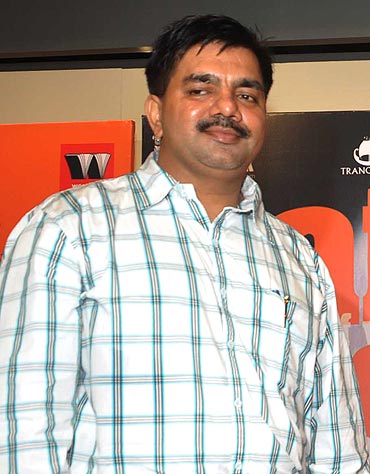
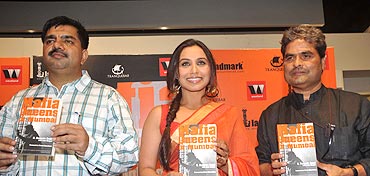
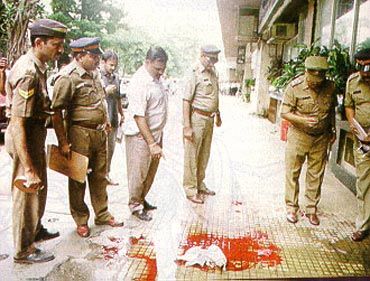
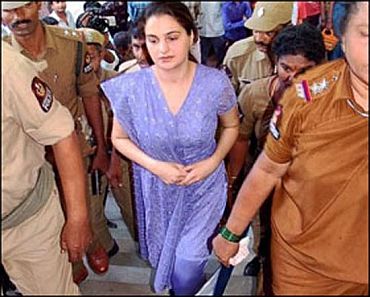
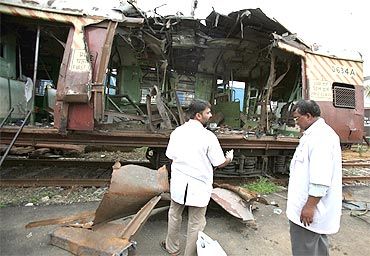
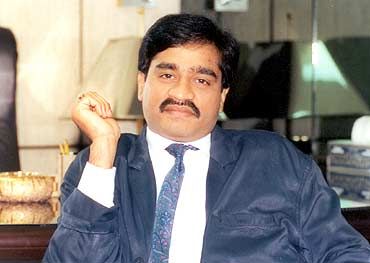
article